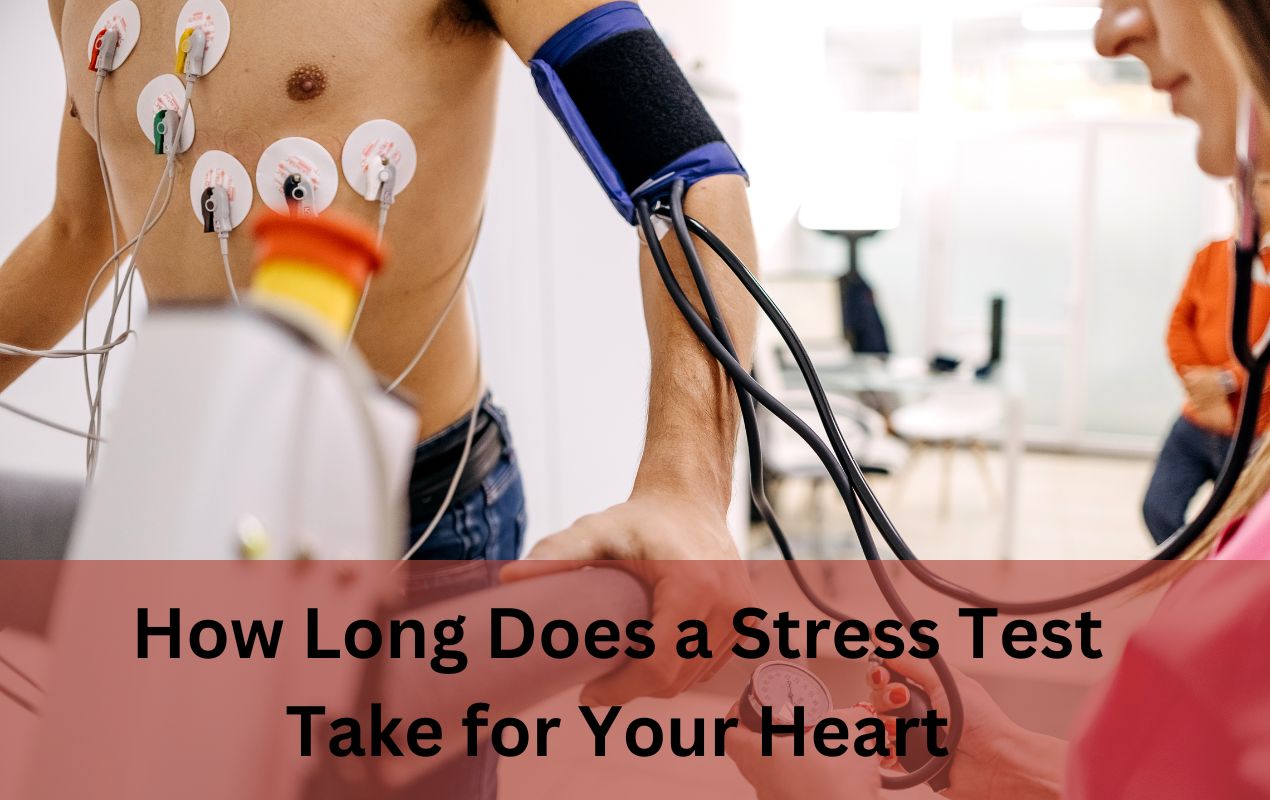Stress tests play a vital role in assessing cardiovascular health, offering insights into the condition of your heart. However, if you’re scheduled for a stress test, you might be wondering, “How long will it take?” In this blog post, we’ll address this common concern by explaining the process and duration of stress tests. We’ll break down the different types of stress tests and provide insights into how long each typically takes, so you can better prepare for your appointment and gain a clearer understanding of what to expect during the test.
Understanding the health of your heart is of paramount importance, and stress tests are a crucial tool in this assessment. These tests provide invaluable insights into your cardiovascular well-being. However, one pressing question that often weighs on the minds of those scheduled for a stress test is, “How long will it take?”
This concern is entirely valid, and in this blog post, we aim to address it comprehensively. Our goal is to shed light on the different types of stress tests and the typical duration of each. By the end of this post, you’ll have a clear understanding of what to expect during your stress test, ensuring you’re well-prepared and informed about this essential step in maintaining your cardiovascular health.
Stress Tests and their importance in assessing cardiovascular health
The heart, often referred to as the engine of our bodies, is a remarkable organ that deserves our utmost attention and care. When it comes to maintaining good cardiovascular health, the ability to assess and understand your heart’s functioning is paramount. This is where stress tests come into play, serving as a pivotal diagnostic tool in the field of cardiology. Stress tests are designed to evaluate the heart’s performance under different levels of exertion, providing critical insights into its functionality and identifying potential issues.
In this blog post, we will delve into the significance of stress tests, highlighting their pivotal role in assessing cardiovascular health, early detection of problems, and the prevention of heart-related complications. We will explore various types of stress tests, the conditions they address, and the valuable information they yield. By the end of this post, you’ll have a comprehensive understanding of why stress tests are an essential aspect of heart health and how they can contribute to a longer, healthier life.
Common concern for individuals undergoing a stress test
For individuals preparing to undergo a stress test, a prevalent and understandable concern revolves around the test’s duration. The uncertainty of how long the test will take can create a sense of apprehension. In this blog post, we aim to alleviate this common concern by providing clarity and insight into the duration of stress tests.
We understand that having a clear understanding of what to expect can help ease anxieties and ensure a more comfortable experience. Our goal is to shed light on the different types of stress tests, their respective durations, and the factors that may influence the time involved. By the end of this post, you’ll be well-prepared, informed, and ready to face your stress test with confidence.
Different types of stress tests and how long each typically takes
Stress tests are invaluable tools for assessing cardiovascular health and are widely employed by medical professionals. However, for those scheduled for a stress test, questions regarding the test’s duration are common and legitimate. Understanding the time commitment involved can help individuals prepare both mentally and logistically. In this blog post, we’ll delve into the world of stress tests, exploring the different types and shedding light on how long each typically takes.
Types of Stress Tests:
Exercise Stress Test: This is the most commonly known stress test. It involves physical activity, often on a treadmill or stationary bicycle, to elevate your heart rate. An exercise stress test typically lasts for about 10 to 15 minutes, though the exact duration can vary based on factors like your fitness level and target heart rate.
Pharmacological Stress Test: In cases where physical exercise isn’t feasible due to a patient’s health conditions or limitations, pharmacological stress tests are used. These tests involve the injection of medications to simulate the effects of exercise on the heart. This type often takes longer than an exercise stress test, with multiple stages, each lasting around 20-30 minutes.
Factors Affecting Stress tests Duration:
Health and Fitness Level: Your overall health and fitness can influence how long the test takes. Those who can achieve the target heart rate more quickly will have shorter tests.
Protocol Chosen: Different medical facilities may use slightly different protocols, which can impact test duration.
Complications: Occasionally, issues like abnormal test results or unexpected symptoms may require additional testing, which can extend the duration.
By the end of this post, you’ll have a clear understanding of the various stress test types and the typical duration associated with each. This knowledge will not only help you prepare for your stress test but also alleviate concerns about the time commitment involved, allowing you to approach the test with confidence and a greater sense of ease.
How an Exercise Stress Test is conducted?
An Exercise Stress Test, also known as a treadmill stress test or an exercise ECG (electrocardiogram), is a common procedure used to assess how your heart responds to physical activity. Here’s a detailed explanation of how this test is conducted, including the use of a treadmill:
- Pre-Test Preparations:
Before the test, you’ll change into comfortable clothing and appropriate footwear, usually sneakers.
The healthcare provider will attach electrodes to your chest, arms, and legs to monitor your heart’s electrical activity (ECG).
Blood pressure cuffs may also be placed on your arm to monitor blood pressure during the test.
A baseline ECG is taken while you’re at rest to establish your heart’s normal rhythm and electrical patterns.
- Starting on the Treadmill:
You’ll step onto a treadmill. The speed and incline of the treadmill can be adjusted to make the exercise progressively more challenging.
The test begins with a slow pace and a slight incline, simulating a gentle walk. As the test progresses, the speed and incline gradually increase.
- Monitoring Vital Signs:
Throughout the test, your heart rate, blood pressure, and ECG are continuously monitored by the medical staff to ensure your safety.
You’ll be asked to report any symptoms you experience, such as chest pain, shortness of breath, dizziness, or fatigue.
- Achieving Target Heart Rate:
The goal of the test is to reach your target heart rate, which is typically a percentage of your maximum predicted heart rate based on your age. This target heart rate is usually chosen to stress your heart adequately.
The test continues until you reach your target heart rate, exhibit symptoms, or if the healthcare provider decides to stop the test for safety reasons.
- Post-Test Monitoring:
Once you’ve reached your target heart rate or have completed the exercise, the treadmill is stopped.
You’ll continue to be monitored for several minutes as your heart rate returns to baseline. This is the recovery phase of the test.
- Test Conclusion:
After the test, the medical staff will review the data collected, looking for any abnormalities in the ECG or symptoms that may have occurred.
If the test results are normal, you may be allowed to return to your normal activities.
In cases of abnormal results, further diagnostic tests or consultations with a cardiologist may be recommended.
Important Notes:
It’s crucial to follow any specific instructions provided by your healthcare provider before the test, such as fasting or medication adjustments.
If you experience severe symptoms or complications during the test, it can be stopped immediately to ensure your safety.
The Exercise Stress Test provides valuable information about your heart’s performance under physical stress and helps in diagnosing conditions like coronary artery disease and arrhythmias. It’s a safe and widely used diagnostic tool for assessing cardiovascular health.
Pharmacological Stress Test
A Pharmacological Stress Test is a diagnostic procedure used when an individual is unable to perform physical exercise due to various reasons, such as physical limitations, medical conditions, or specific contraindications for exercise. Instead of using a treadmill or stationary bicycle to increase the heart rate, this test involves the administration of medications that simulate the physiological effects of exercise on the heart.
Here’s a detailed explanation of how a Pharmacological Stress Test is conducted:
- Pre-Test Preparations:
Before the test, you will typically be asked to refrain from consuming food or caffeine for a few hours to ensure the accuracy of the test results.
Electrodes are attached to your chest, arms, and legs to monitor your heart’s electrical activity (ECG).
Blood pressure cuffs are placed on your arm to monitor blood pressure throughout the test.
- Medication Administration:
A healthcare provider administers medications, such as adenosine, dipyridamole, or dobutamine, intravenously. These medications work in different ways to induce stress on the heart.
- Monitoring Vital Signs:
As the medication begins to take effect, your heart rate, blood pressure, and ECG are continuously monitored to track your body’s response to the medications.
It’s crucial to communicate any symptoms you experience during the test, such as chest discomfort, shortness of breath, or palpitations.
- Inducing Stress:
The medications aim to mimic the effects of physical exercise on the heart, such as increasing the heart rate, dilating blood vessels, or affecting blood flow.
The test continues until your heart rate reaches the target level or if you experience significant symptoms that require discontinuing the medications.
- Post-Test Monitoring:
After the stress portion of the test is completed, the medications are gradually discontinued.
You will be monitored for a period to allow your heart rate and blood pressure to return to baseline.
- Test Conclusion:
Once the test is completed, the collected data, including the ECG and any symptoms you may have experienced, are analyzed.
Normal test results mean that your heart has responded appropriately to the medications.
Abnormal results may indicate issues like coronary artery disease or other heart conditions and may require further evaluation or consultation with a cardiologist.
The Pharmacological Stress Test provides valuable information about the heart’s performance under simulated stress conditions, making it a useful diagnostic tool when traditional exercise stress tests are not feasible. It offers a safe and controlled environment to assess cardiovascular health, helping medical professionals make accurate diagnoses and treatment decisions.
Factors Affecting the Duration of a Stress Test:
- Patient’s Overall Health:
The patient’s baseline health and physical condition can significantly impact the duration of the stress test. Individuals who are physically fit and have good cardiovascular health may reach their target heart rate more quickly during an exercise stress test, potentially shortening the test duration.
On the other hand, patients with underlying health issues, such as pre-existing heart conditions, may require a longer test duration to reach their target heart rate, especially if their cardiovascular system responds less efficiently.
- Specific Protocol Chosen:
Different medical facilities or healthcare providers may follow slightly different protocols for stress tests. The specific protocol chosen can affect the overall duration.
For example, the speed and incline settings on the treadmill or the type and dosage of medications used in a pharmacological stress test may vary from one facility to another, impacting the time needed to reach the desired level of cardiac stress.
- Complications During the Test:
Occasionally, complications may arise during a stress test that can prolong the duration. Complications may include:
Development of abnormal symptoms: If a patient experiences concerning symptoms like chest pain, severe shortness of breath, or irregular heart rhythms during the test, the healthcare provider may need to stop or modify the test. Addressing these symptoms and ensuring the patient’s safety takes precedence over the test duration.
Abnormal test results: If the initial test results are abnormal or inconclusive, the healthcare provider may opt for additional testing or additional stress stages. This can extend the overall duration of the stress test.
Technical issues: Technical problems with monitoring equipment or the test protocol may occasionally necessitate retesting or extending the test duration.
In conclusion, the duration of a stress test can vary based on several factors, including the patient’s health, the specific test protocol, and any complications that may occur during the test. Healthcare providers prioritize patient safety and accurate results, so adjustments to the test duration may be made as needed to ensure the well-being of the patient and the effectiveness of the test.
Preparing for a Stress Test:
Undergoing a stress test can be a valuable step in assessing your cardiovascular health. To ensure the test goes smoothly and provides accurate results, here are some key tips for preparing:
Wear Comfortable Clothing: Opt for loose-fitting, comfortable clothing. You’ll likely be exercising on a treadmill or stationary bicycle, so attire that allows for easy movement is ideal.
Choose Appropriate Footwear: Select comfortable, supportive athletic shoes or sneakers with non-slip soles. Well-fitting footwear can help you maintain balance and reduce the risk of injury during the test.
Avoid Heavy Meals: Refrain from consuming heavy or large meals in the hours leading up to the test. A full stomach can lead to discomfort while exercising and affect the results.
Stay Hydrated: It’s essential to stay hydrated, but don’t consume excessive fluids just before the test to prevent the need for bathroom breaks during the test.
Medication and Supplements: Discuss with your healthcare provider whether you should continue taking your regular medications on the day of the test. In some cases, they may advise you to temporarily adjust your medication regimen.
Caffeine and Tobacco: Avoid consuming caffeinated beverages or tobacco products in the hours before the test, as these can affect your heart rate and blood pressure.
Consult with Your Doctor: If you have specific concerns or questions about the test, consult with your healthcare provider before the appointment. They can provide guidance tailored to your individual health needs.
Plan for Transportation: Depending on the results of the test, you may experience fatigue or other symptoms. Arrange for transportation back home in case you don’t feel well after the test.
Arrive Early: Plan to arrive at the testing facility a bit early to allow time for check-in, paperwork, and any preliminary measurements.
Stay Informed: Ask your healthcare provider for a clear explanation of the test, its purpose, and what you can expect during and after the test. Knowing what to anticipate can help ease anxiety.
By following these preparations and heeding your healthcare provider’s advice, you’ll be well-prepared for your stress test. Remember that the goal is to evaluate your heart’s performance accurately, and your cooperation and readiness are crucial to achieving that objective.
Key Points Discussed in the Blog Post:
Stress tests are essential tools for assessing cardiovascular health and diagnosing heart-related issues.
Individuals often have concerns about the duration of stress tests.
Two primary types of stress tests: Exercise Stress Test and Pharmacological Stress Test.
An Exercise Stress Test typically takes about 10 to 15 minutes, with duration influenced by fitness levels.
Pharmacological Stress Tests can last longer, around 20-30 minutes, as they involve medication-induced stress.
Factors affecting test duration include the patient’s health, the chosen protocol, and any complications.
Proper preparation, including comfortable clothing and footwear, is vital for a successful stress test.
Open communication with healthcare providers and understanding the purpose of the test is key.
Understanding the differences in stress test types, typical durations, and the various factors that influence the test’s length is crucial for individuals scheduled for these tests. Adequate preparation and clear communication with healthcare providers are essential for a smooth and productive stress test experience.
How long does it take to do a Lexiscan Stress Test
A Lexiscan stress test, also known as a Lexiscan nuclear stress test, typically takes about 15 to 30 minutes to complete. This test is used to assess the blood flow to your heart and evaluate how well your heart is functioning. It involves the administration of a medication called Lexiscan, which simulates the stress on your heart that would occur during exercise. The duration of the test may vary slightly based on the specific protocols and procedures followed by the healthcare facility and healthcare provider conducting the test. It’s essential to follow your healthcare provider’s instructions and be prepared to spend some time at the testing facility to complete the Lexiscan stress test.



